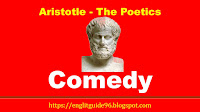Aristotle
- The Poetics
Style
Aristotle’s remarks on the language of poetry
in Poetics anticipated his comments on style in Rhetoric. In both he lays down
two essentials of good writing-clearness and prosperity. The object of writing
being to communicate the writer’s meaning, it has, first, to be clear or intelligent,
but as the meanings to be conveyed are different at different times, the same
mode of writing may not be proper for them all. What is therefore needed, next,
is the propriety or suitability of each mode of writing to the meaning it is
intended to convey. For intelligibility current words are the best, for they
are familiar to all, but writing being an art, it should aim at dignity and
charm also. These are best attained by the use of unfamiliar words-archaic
words, foreign words, dialect words, newly-coined words- that have an element
of surprise and novelty in them. For the same reason the metaphysical use of
words, conveying a hidden resemblance between things apparently dissimilar, is
to be preferred to the plain. It partakes both of the familiar and the
unfamiliar. It looks like familiar because ‘all men in their ordinary speech
make use of metaphors’ and unfamiliar because it often discerns resemblances of
surprising nature. A perfect poetic style uses words of all kinds in a
judicious combination. All the same, compound words are best suited to the
lyric which strives after ornament, rare or unfamiliar words to the epic which
needs to be stately in expression, and metaphorical language to the drama which
keeps as close as possible to everyday speech.
The
Use of Metaphor
So
far Poetics and Rhetoric follow more or less the same line, but Rhetoric is
further remarkable for its comments on composition in prose and style in
general. ‘The style of prose’, it says, ‘is distant from that of poetry’, for
whereas poetry largely draws upon unfamiliar words to attain dignity and charm,
prose, dealing with everyday subjects, can use only familiar or current words.
However, one source of charm is common to both-the use of metaphor. By employing
it judiciously prose can also introduce an element of novelty and surprise in
its otherwise plain statements. In the arrangements of words into sentence, it
should avoid multiplicity of clauses, parenthesis and ambiguous punctuation.
Words can be arranged into two kinds of style –loose or periodic. The loose
style is made up of a series of sentences, held together by connective words.
In the periodic style each sentence is a complete whole with a beginning, an
end and a length (or magnitude) that can be comprehended at a glance. Each such
sentence may form part of a bigger whole if the sense so requires it. While the
loose style is formless, being just a chain of sentences that may be increased
or reduced at will, the periodic style has a form that cannot be so easily
tampered with. The loose style therefore is less intelligent than the periodic
and also less graceful. The one just runs on, and the other follows a measured
course that imparts to it the charm of poetry.






















0 Comments